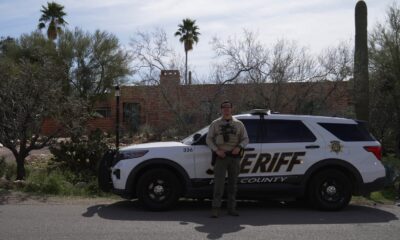Local News
Toronto police 911 centre wait times nearly hit 12 minutes, but why do delays keep happening?

Delays in getting through to the Toronto Police Service’s 911 communications centre have been well documented in recent years, but despite promises of corrective action there are still periods where callers face major wait times.
The Leader Spirit recently learned through a source not authorized to speak publicly that 911 callers faced for an unspecified duration Thursday afternoon a wait time just shy of 11 minutes and 45 seconds.
To better appreciate that hold time, a The Leader Spirit camera operator was able to drive to the Don Valley Parkway from the Pickering-Toronto border (by way of Kingston Road and on Highway 401) in the same period.
The Toronto police communications centre is the first point of contact for anyone in the city who calls 911, and that includes people who are calling about medical-, fire- and crime-related emergencies.
The Leader Spirit contacted the Toronto Police Association (TPA), the union representing frontline service members, to ask about recent wait times. The association confirmed it independently heard the same information from a member or members.
“It’s absolutely atrocious,” newly elected TPA president Clayton Campbell told The Leader Spirit on Monday.
“Those are top-tier calls, right … and we also had 50 911 calls in pending. That’s 50 911 calls not being answered and it’s an absolute disgrace that’s happening in the city.”
Campbell said he’s been made aware of other recent instances of eight-to-nine-minute waits to get through to 911.
He said staff recruiting and retention at the centre continue to be major problems for the Toronto Police Service.
“They’ve been trying to hire down there for the last year. They’ve only netted two [communications] operators — two for the entire city. There are times there [are]11 people taking 911 calls per city of three million,” Campbell said.
“There is a high failure rate for this position because it’s high stress, it’s difficult, it’s challenging, it’s multitasking.
“Ultimately, if the Police Services Board doesn’t step up and give those members what they deserve, this is going to be an ongoing issue.”
He said the starting salary has been a major point of contention with some members leaving for better salaries.
According to 2024 figures provided by the TPA, salaries start at $97,000 for Toronto police communications staff while Peel Regional Police and Niagara Regional Police start their employees at $106,000.
“In London (Ontario), those communication operators make $13,000 more a year than our members. Why would they stay here? The call volume is out of control. They’re burnt out and they can go to a smaller service, work less and make more money,” Campbell said.
He added some other issues go beyond compensation such as the declining state of the Toronto police communications facilities.
“The main site is out of date and needs to be updated. It needs renovations. It needs proper equipment, even something as simple as chairs,” Campbell said.
“There’s also a backup site and it’s atrocious. There’s not even a place for our members to have lunch. There’s nowhere to sit and take a break.”
The Leader Spirit contacted the Toronto Police Service on Friday to ask for an on-camera interview to talk about the reports of lengthy delays and to talk about ongoing issues facing the centre, but a representative declined.
In statements issued on Friday and Monday, a spokesperson said they didn’t have specific information about Thursday. They said the current average answering time for 911 calls in October is a minute and seven seconds.
“At times major events can cause sudden spikes in call volumes, leading to temporarily longer wait times. Our city regularly experiences such events, sometimes multiple times a day, which can affect response times during those periods,” Stephanie Sayer wrote.
She went on to say the service is “improving online tools to reduce non-emergency calls so that operators can focus on real emergencies,” adding a new public awareness campaign on 911 and other services will be launched at the end of the month.
Sayer added the service is working to higher more people to “help improve response times and ensure [the] team is better equipped to handle emergency situations.”
Many ongoing issues echoed in Toronto auditor general’s report
The issues about staffing were highlighted in a 2022 Toronto auditor general’s report, which noted the communications centre handles approximately 1.1 million 911 calls and 700,000 non-emergency calls.
After analyzing data between 2018 and 2021, the auditor general’s office found the Toronto Police Service on average didn’t meet the National Emergency Number Association (NENA)‘s standard of answering 90 per cent of 911 calls within 15 seconds. They said call volume and staffing levels were the two biggest factors. They also noted many other jurisdictions had difficulties too.
The report said the average answer time of 28 seconds and the peak times were between 10 a.m. and 10 p.m.
Of all the calls that came in on the 911 line, 43 per cent were for emergencies, 18 per cent were classified as “abandoned,” 14 per cent were for information, 12 per cent for non-police-related matters, 10 per cent were deemed non-emergency and three per cent were pocket dials.
When it comes to staffing during the same three-year period, auditors said there were just three days when the centre had no absent employees. They said there was a high daily absence rate due to illness and mental health-related concerns.
As for response times of officers, in 2019 the report found the average response time for priority one calls (with life in danger) was around 19 minutes and 50 minutes for priority two calls.
The auditor general made 26 recommendations aimed at improving the situation, including public education on alternative numbers to call instead of 911, modernizing systems and technology, using data to get a better baseline for minimum staffing and staff accordingly, clarifying procedures in the operating and more up-to-date reporting by officers of when they were free. The office said the service agreed with the recommendations.
The Leader Spirit attempted to contact the auditor general’s office for comment on Monday to discuss the ongoing issues, but a representative declined to comment.
Understanding the 911 call standards
A spokesperson for the NENA, which is a non-profit organization dedicated to 911 operations, developed a national standard of answering 911 calls 90 per cent of the time in 15 seconds and 95 per cent of the time in 20 seconds was determined to be a “reasonable threshold” by experts. It has since become a benchmark for organizations across North America.
“It’s kind of a balance of what is ideal, which would be zero seconds, and what is reasonable as well as what handles the incident,” Brandon Abley, NENA’s chief technology officer, told The Leader Spirit on Monday.
“We know that in 911 when we save seconds, we save lives, and every single second counts within a 911 call.
“The difference between a few seconds can mean the difference between whether they live and die, so that’s why each second is so important to the 911 call.”
Abley wouldn’t comment specifically on the Toronto Police Service’s handling, or how any other service specifically handles calls, but he said 10 or more minutes ” is not usual.” However, he said staffing shortages and not keeping pace with current technologies are common among agencies responsible for 911 calls.
More to come.












